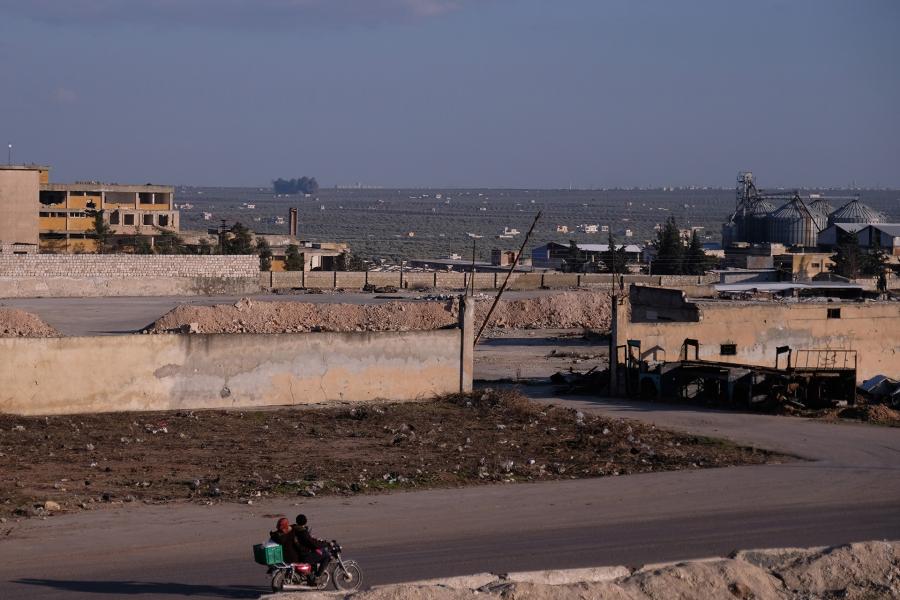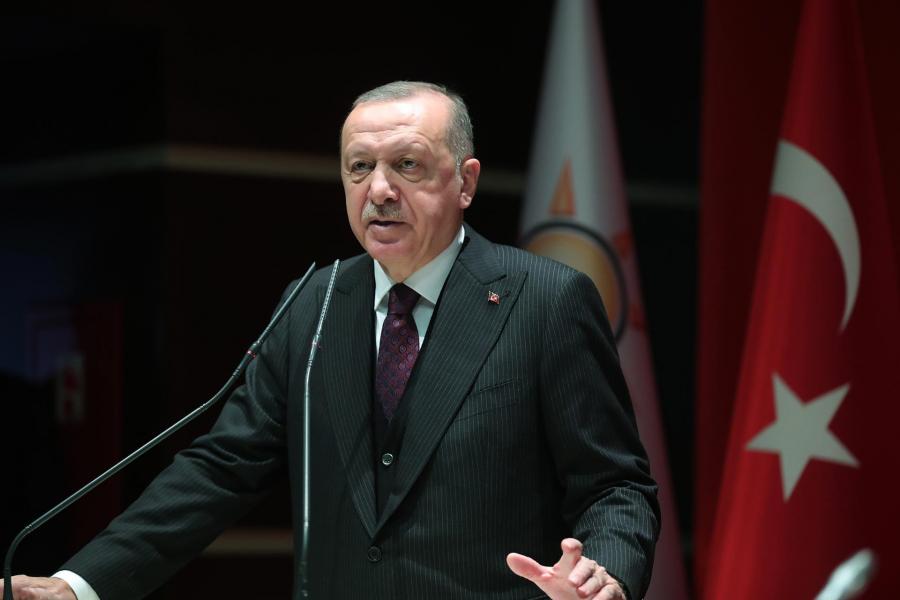Prof. Dr. İlhan Uzgel and Russia expert Kerim Has assessed the latest developments in Syria and Idlib for Evrensel.
The Idlib tension continues to mount. The Ministry of National Defence announced the deaths of two soldiers and the wounding of another five soldiers in İdlib. At around the same time, the Anadolu Agency intimated that members of the “moderate” opposition had launched an operation against the Syrian army in the Idlib-located town of Nayrab. Issuing a statement following the reports, the Russian Ministry of Defence in turn stated that the assault had been repulsed with the intervention of Russian air forces and called on Turkey to stop supporting armed militants.
Experts who have assessed the ongoing developments for Evrensel stress that the doggedness in Idlib is full of risk.
Recalling that there had been previous losses of lives of soldiers in Idlib, Prof. Dr. İlhan Uzgel pointed out that the military operation would have high-cost consequences in both political and diplomatic as well as legal and military terms. According to Uzgel, who says, “America is not troubled by the conflict in Syria,” the carrying of this conflict into a new dimension by Turkey is compatible with America’s interests.
According to Russia expert Kerim Has, for his part, what is entailed in Idlib is not Turkey’s interests but the AKP-Erdoğan’s “political” ambitions. Saying that for this reason the soldiers under the Syrian army’s control at the observation points have not been withdrawn, Has commented, “The power holders in Ankara think that ‘news of the fallen’ coming from Syria serves as it were as ‘petrol’ for the perpetuation of their own existence.”
İLHAN UZGEL: THE POLITICAL, MILITARY AND DIPLOMATIC CONSEQUENCES WOULD BE SEVERE
Prof. Dr. İlhan Uzgel considers there to be a low probability of a direct operation. Recalling that Turkey had primed itself as if conflict was in the offing and had amassed troops in the region, Uzgel said, “I mean, the prevailing intention in military terms here was for deterrence. Why do I say this? You know the Turkish observation points in Idlib have remained in places the Syrian army controls and it is at the very least trying to secure these and to attain deterrence with a strong build-up to ward off attack. This is the first stage.”
Saying that the second stage is, “Expelling the Syrian units beyond the Sochi Agreement borders,” Uzgel continued, “This would be a riskier action. It would be an action that engenders far more high-cost consequences in both political and diplomatic as well as legal and military terms. There is a lower probability of encountering this because in the end you are in another country’s territory and would be battling it to secure spatial expansion. The perception of this in the world, including the Arab world, and especially the perception of this in Russia, would be extremely negative. I mean, build up as many troops as you like, in the end you are in another country’s territory. Furthermore, Turkey’s military units and observation points are at extremely fatigue-prone locations. The operation would have high-risk consequences because a countermove could come and military fatalities have previously been experienced in any case. If further such instances occurred, it would come at a heavier price in domestic politics and I do not really imagine this would be a strain it could withstand.”
Saying that there may nevertheless be surprise steps, Uzgel continued, “All of this has to do with the extent to which it takes these risks, for example will it risk the loss of soldiers or will it risk appearing more aggressive in the international arena, given that Turkey has appeared to be complying with the agreement until now?”
“IF THERE IS TALK OF ‘STRATEGY’ SOMEWHERE, IT MEANS AN ATTRITION OF PEOPLES”
Assessing the unfolding process in Syria since 2011 also from the viewpoint of the peoples of the region, Uzgel had the following to say: “With talk of strategy, security and such like starting, the attrition of peoples is beginning. That is, if there is talk of a strategy somewhere, it means a process in which there is an attrition of peoples has begun. And this is what we are experiencing, not just in Syria; all the peoples of the region are experiencing this.”
“AMERICA WANTS THE CONFLICT IN SYRIA TO CONTINUE”
Well, where is the USA in these discussions? With US President Donald Trump saying, “We are working together with Erdoğan over Idlib,” President Erdoğan has pronounced, “We may have all kinds of solidarity with the US at any time.”
Assessing the US’s attitude, Prof. Uzgel says, “America wants Turkey to stay in Idlib and for the presence of Islamist radicals to continue, too. In the end, a portion of them were trained under America’s train-equip programme and it inserted a portion of them there in conjunction with Turkey; they consist of warriors to which it blinded its eyes. America is not actually troubled by the dynamic of conflict in Syria, and the carrying of this conflict into a new dimension by Turkey is not contrary to America’s interests and America is consequently at Turkey’s rear in this affair. This in fact is one of the reasons lying behind the ease with which Turkey acts.”
Stating that America and Russia have never come into confrontation and will not do so, Uzgel said, “Just as today, they get on pretty fine by involving other countries. It is taking place through Turkey’s frontal war with Syria, not with Russia – Russia will not wage war with Turkey, it has America and NATO behind it and it has called them to duty, too. America has found a fresh means to keep Turkey on the anti-Russian front and, as such, it hopes to confront the Syrian army here without touching Russia.
KERİM HAS: OPERATION BEING MOOTED DUE TO ERDOĞAN’S “POLITICAL AMBITIONS”
According to Russia expert Kerim Has, President Erdoğan’s pronouncement, “The operation against Idlib is imminent” and Russia’s reply, “Ankara waging war against the Syrian armed forces on Syrian territory is the worst-case scenario” need to be taken seriously. Has said, “I am of the opinion that President Erdoğan is seriously contemplating the option of war with Syria, not because Turkey’s interests demand it, but to further his own political ambitions and cravings. In my estimation the power holders in Ankara think and are calculating that ‘news of the fallen’ coming from Syria serves as it were as ‘petrol’ for the perpetuation of their own existence.”
Considering the non-withdrawal of troops from the remaining Turkish observation points in Idlib that are besieged on all sides by the Syrian army and have to meet all their needs including day-to-day provisions under Russian supervision as a pointer towards this, Has commented, “If a war breaks out, it is probable that the Turkish troops surrounded by regime forces which will become priority targets will needlessly be left virtually hostage.”
COUP DEBATE NOT INDEPENDENT OF THE SITUATION IN SYRIA
Pointing out that the tension the AKP is experiencing with Russia over Syria has further accentuated the squabbles and differences of opinion between groups known to be “nationalist and Eurasianist” and the “components in the depths,” Kerim Has thinks that the discussion of coups and assassination allegations that have become hot issues of late are directly related to developments in Syria.
IT WOULD INCREASE RUSSIA’S SUPPORT FOR DAMASCUS
According to Kerim Has, assessing Dmitri Peskov’s comment, “It would be the worst-case scenario for Idlb” in responding on Russia’s behalf to Erdoğan’s operation pronouncement, Russia’s policy is clear: “It is an updated Sochi Agreement whereby the M4 and M5 motorways pass into Damascus’s control, the terrorist and jihadist elements are shoved away towards the Turkish border and at the very least the besieged Turkish troops are removed from the region. But it is abundantly clear that this agreement will also be temporary and regime forces, having rested for a while, will advance inside Idlib.
Secondly, President Erdoğan directly and openly targeting Syrian military positions in Syrian territory without any attack would lead to an increase in the support Russia gives the Damascus administration, which it stands behind anyhow. In this case, the Turkish army would be confronted not just by Assad regime forces, Hezbollah and Iranian-supported militias, but by Russia. If the conflict did not remain confined to Idlib and spread to Afrin and the Peace Fountain region, Russia might engage the Syrian Kurds and take certain critical steps that could lead to Ankara suffering ‘rout’ on the ground.
The AKP administration for its part appears to wish for the regime to withdraw to the borders of one and a half years ago in Idlib. It is no exaggeration to say that it is impossible for Ankara to attain this goal under prevailing conditions.”
Has stresses that all these possibilities depend on whether “President Erdoğan will acquiesce even temporarily to an updated Idlib with a changed map.”
“RUSSIA MAY BRING OLD AND NEW DOSSIERS DOWN FROM THE SHELVES”
Russia expert Kerim Has noted that, if Ankara embarks on direct war with Syria, Moscow may bring the ISIS dossiers down from the shelves that it submitted to the UN Security Council at the time of the plane crisis which initiated the process leading to President Erdoğan apologizing or that fresh ones may follow these. Has continued, “Such personal ‘blackmail tools’ that may lead to the airing of ‘dirty laundry’ ranging from relations with diverse warriors in Syria to transfers of Jihadists to Libya and from the ledgers of Reza Zarrab, whose men were apprehended at Moscow Vnukovo airport, to the lowdown on 15 July are contained in Pandora’s Box and its opening and use has in fact been awaited for a long time.
One of the most important points the Kremlin learnt in the plane crisis is that it can attain a speedier and easier result if, rather than bringing itself into confrontation with Turkey as a country, it squeezes its rulers. Otherwise, it would neither have been able to sell Ankara the S-400s for which Turkey has absolutely no need in military terms nor construct TurkStram without giving Ankara anything in return. Hence, the price of such actions as calling NATO into Idlib, needing Trump’s aid or adopting a position that encourages the US to stage an air operation in Syria will most probable serve no other purpose than increasing the cost of the war for Ankara.”
Article by Meltem Akyol
Translated by Tim Drayton

